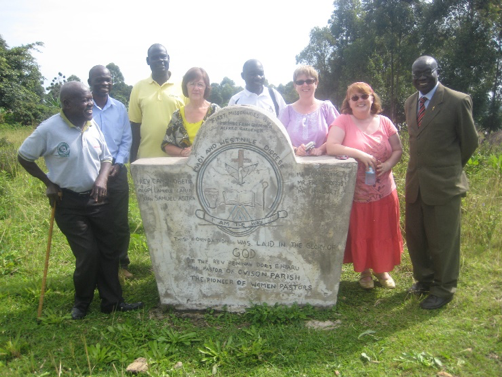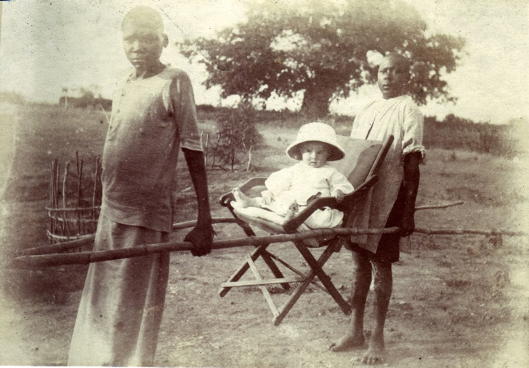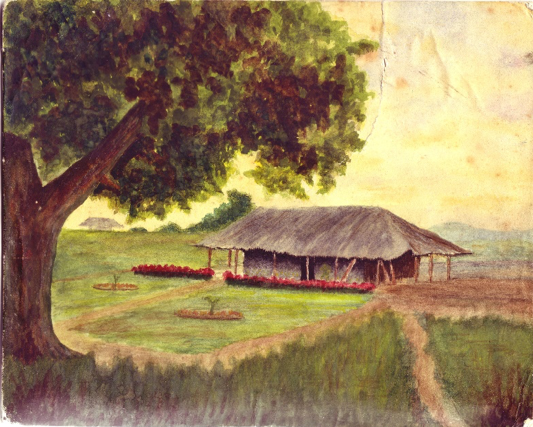How Baptists planted an Anglican church
A Baptist church in Worcester has developed a friendship with a thriving cathedral in Uganda, discovering its humble roots in a Baptist family called Gardner. It's a wonderful illustration of the parable of the mustard seed, writes Alison Southall

Members of Fernhill Heath Baptist Church and Emmanuel Cathedral visiting the memorial stone in 2014
Fernhill Heath Baptist Church is a small church on the outskirts of Worcester and for the last eight years we have been developing a partnership with Emmanuel Cathedral in Arua, north-west Uganda. On the surface, our two congregations do not have much in common: a Baptist church with around 40 members and an Anglican cathedral with three morning services of around 1000 people. However, a deep and fruitful Christian friendship has developed.
On one of Fernhill Heath Baptist Church’s visits to Arua, we had the opportunity to visit a memorial stone recording the first missionaries who brought the gospel in 1918, 100 years ago. They were English Baptists, like ourselves: Frank Gardner, his wife, Edith, and his brother Alfred. As we entered the centenary year and plans were being made by Ma’di and West Nile Diocese to celebrate this important milestone, interest was revived in these Baptists who somehow planted the seed that grew into a thriving Anglican church.
Our knowledge of the spread of the gospel in this area was limited to the beginning of this 100-year period – when there was no Christian presence - and the end of the first centenary – when the church was thriving. Trying to join the dots from each end of the centenary is a wonderful illustration of the parable of the mustard seed: small beginnings of Christian witness which resulted in an abundant crop.
The West Nile district of Uganda had no Christian witness until 1918. Africa Inland Mission (A.I.M.) was developing its work nearby in north-east Congo, whilst the Church Missionary Society, who were at work in the rest of Uganda, did not have the human resources to extend this beyond the Nile. When a group of A.I.M. missionaries en route to the Congo passed eastwards through West Nile in 1917, the District Commissioner asked for A.I.M.’s help.
Meanwhile, the Gardners, Baptists from Chipping Norton, were approaching West Nile from the other direction. Frank, Edith and Alfred Gardner, who had previously served in Nyasaland (now Malawi), were missionaries in the Belgian Congo with CT Studd’s Heart of Africa Mission.
They had faced difficulties getting to the Congo. Firstly, Frank and Edith had to make the heart-breaking decision to leave their three-year-old daughter, Edith, behind in England. Then, their plans to sail were frustrated when Frank and Alfred were told that they needed to face a military tribunal before leaving the country (as it was in the middle of WWI).
After a months’ delay, they reached the Belgian Congo in late 1916 and worked there for a year. However, some of Studd’s policies and his style of leadership caused great concern to the Gardners, along with a number of other missionaries. They were able to transfer to A.I.M, who allocated them to open a new mission station in Arua, in Uganda, and thus to bring the gospel to this area for the first time.

Beryl Gardner in Arua
And so the mustard seed was planted by the appropriately-named Gardners. They arrived in Arua on 10 June 1918, along with Frank and Edith’s six-month-old daughter, Beryl. But as all gardeners will know, much can go wrong once the seed has been planted.
Edith writes in her diary:
Pioneer work is not easy. To get up a good house with few workers, little money, the language not reduced to writing, no gardens and very little food to buy, is a real job of work.
The land where they were building their home and setting up the mission station had been given by a local chief called Awudele. He had been the first of the Lugbara tribe to make contact with the District Commissioner, Mr Weatherhead when he arrived in Arua a few years earlier. He attended the services started by the Gardners, and continued to attend church until the age of 120, although it was not until he was close to his death that he became a Christian – and also confessed polygamy with ten wives as well as adultery with other people’s wives!
The Gardners’ desire was to learn Lugbara, the local language, and to begin work preaching the gospel to the villages around them. However, much of their time was absorbed by house-building, and battling illness. Frank and Alfred built mud huts as temporary accommodation, alongside a tent which they lived in whilst they built a permanent house.
In the end, they were unable to complete this building work due to Spanish flu and numerous bouts of malaria. Eventually, one attack of malaria developed into blackwater fever for Frank, a devastating illness that had affected him twice before, and had caused the deaths of a number of other missionaries. This illness nearly killed Frank, and it was clear that, after less than a year in Arua, they would not be able to stay. Edith writes that Frank ‘wept as he thought of all he had hoped to do at Arua’.

A painting by Frank Gardner of the house they were building in Arua
Frank, Edith and baby Beryl travelled to Kenya where the climate was better suited to Frank, and they continued to serve A.I.M. there for another four years until they returned to England.
However, during the limited time that the Gardners were in Arua, they were able to start a Sunday morning service in the tent or under a large tree. Some of the local Lugbara would ‘creep’ in, including Awudele. His wife was one of the earliest Christians, and their daughter Rasili, now aged 103, still worships at Emmanuel Cathedral which is just a few metres from the first meeting place. The work started here was continued by other A.I.M. missionaries, slowly at first, but within a few years the missionaries were crying out for reinforcements to help with the large numbers who were responding to the gospel. At an A.I.M. conference in 1933, the work in the West Nile District of Uganda was described as “providing perhaps the greatest evangelistic opportunity before the A.I.M. at the present time.” (Inland Africa, Jan-Feb 1933).
The church has encountered many challenges during its 100-year history including church schisms triggered by the Revival Movement, and Civil Wars which devastated the country. However, by the 21st century, the Ma’di and West Nile Diocese now has close to a million Christians, and since the 1940s around 480 clergy have been ordained. It is hard to imagine a time when there was no church as its influence is now so significant.
Edith Gardner described her time in Arua in this way: Sunshine and shadows. This is life all through!
The church in West Nile, too, has experienced sunshine and shadows, but throughout this God has caused that small mustard seed to grow. Frank and Edith Gardner’s great-grandson, the Revd Adrian Beavis, sums up their experiences of 1918-19 so well:
I hope this encourages us never to think fruitfulness and faithfulness are judged by size. That even in pain and seeming failure God is still at work.
No matter how small the seeds we think we are sowing today, God is the Lord of the harvest and can ‘bring forth a fruit hundred-fold’. So ‘don't despise the day of small beginnings’ and KEEP SOWING!!’
Alison Southall is a member of Fernhill Heath Baptist Church, Worcestershire
Baptist Times, 20/09/2018